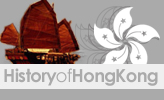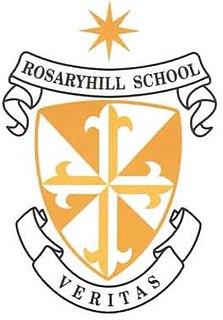
Hong Kong, officially the Hong Kong Special Administrative Region of the People's Republic of China (HKSAR), is a metropolitan area and special administrative region of the People's Republic of China on the eastern Pearl River Delta of the South China Sea. With over 7.5 million residents of various nationalities in a 1,104-square-kilometre (426 sq mi) territory, Hong Kong is one of the most densely populated places in the world.

The Government of the Hong Kong Special Administrative Region, commonly known as the Hong Kong Government or HKSAR Government, refers to the executive authorities of Hong Kong SAR. It was formed in July 1997 in accordance with the Sino-British Joint Declaration of 1983, an international treaty lodged at the United Nations. This government replaced the former British Hong Kong Government (1842–1997). The Chief Executive also nominates principal officials for appointment by the State Council of the People's Republic of China. The Government Secretariat is headed by the Chief Secretary of Hong Kong, who is the most senior principal official of the Government. The Chief Secretary and the other secretaries jointly oversee the administration of the SAR, give advice to the Chief Executive as members of the Executive Council, and are accountable for their actions and policies to the Chief Executive and the Legislative Council.

The Sino-British Joint Declaration is a treaty signed between the United Kingdom and China on Hong Kong under Chinese sovereignty. Signed on 19 December 1984 in Beijing, the declaration describes the sovereign and administrative arrangement of Hong Kong after 1 July 1997, when the lease of the New Territories was set to expire according to the Convention for the Extension of Hong Kong Territory.
The Department of Canadian Heritage, or simply Canadian Heritage, is the department of the Government of Canada that has roles and responsibilities related to initiatives that promote and support "Canadian identity and values, cultural development, and heritage."

{{}}

The Leisure and Cultural Services Department (LCSD), is a department in the Government of Hong Kong. It reports to the Home Affairs Bureau, headed by the Secretary for Home Affairs. It provides leisure and cultural activities for the people of Hong Kong, which was also one of the tasks of the former Urban Council, and Regional Council and Home Affairs Bureau. It manages various public facilities around Hong Kong including public libraries, swimming pools, and sports centres. The well-known Hong Kong Cultural Centre and Hong Kong Space Museum are among several museums also managed by the department. It was established in 2000 and its headquarters is in Shatin, New Territories.
Hong Kong Shue Yan University is a private liberal-arts university in North Point, Hong Kong. Founded in 1971 as Hong Kong Shue Yan College (香港樹仁學院) by Henry Hu and Chung Chi-yung, it was unilaterally recognised as the first private university by the order of the Chief Executive on 19 December 2006.
Hing-yan Chan is a composer and music educator. He is the James Chen & Yuen-Han Chan Endowed Professor in Music of University of Hong Kong.

Ir Albert Lai is the CEO of Carbon Care Asia, a social business in carbon strategy and sustainability innovation. He is the founding chairman of The Professional Commons, an independent public policy think-tank and the Hong Kong People’s Council for Sustainable Development, as well as founding Vice-Chairman of the Civic Party. He also served as a member of the Commission on Strategic Development, and a member of the Strategy Sub-Committee, Council for Sustainable Development, Hong Kong SAR Government.

This article details the history and status of Heritage conservation in Hong Kong, as well as the role of various stakeholders.

Cattle Depot Artist Village is located on 63 Ma Tau Kok Road, Ma Tau Kok, Kowloon, Hong Kong. The site was originally used as a slaughterhouse from 1908 to 1999. It was renovated and developed into a village for artists in 2001. It is now home to around 20 art groups.

The Constitutional and Mainland Affairs Bureau is an agency of the Government of Hong Kong responsible for the implementation of the Basic Law. The bureau is the intermediary between the HKSAR Government and the Central People's Government and other Mainland authorities under the principles of "One Country, Two Systems".

Zuni Icosahedron is a Hong Kong-based international experimental theatre company. Founded in 1982, Zuni is one of the nine major professional performing arts groups subsidised by the HKSAR government and has produced more than 190 original productions of alternative theatre and multimedia performances. As well as theatre works, Zuni is also active in video, sound experimentation and installation art, as well as working in the areas of arts education, arts criticism, cultural policy research and international cultural exchange.

Public swimming pools in Hong Kong are managed by the Leisure and Cultural Services Department (LCSD). There are 44 public swimming pools in Hong Kong; 9 in Hong Kong Island, 13 in Kowloon, and 22 in the New Territories. LCSD manages public swimming pools according to Law of Hong Kong Chapter 132 sections 42 to 45.
Le French May is an annual arts festival organized by the Consulate General of France in Hong Kong & Macau to promote French art and culture. Events include visual arts, operas, classical and contemporary dance, music and theatre, circus as well as cinema. The festival also promotes French fashion and cuisine. The festival is usually held from April to June. A Picasso exhibition from May to July 2012 received 300,000 visitors.
The Hong Kong Arts Development Council (ADC) is a statutory body in Hong Kong tasked with development of the arts in the territory.

Innovation and Technology Bureau (ITB) is one of the policy bureaus under the Government Secretariat of the Government of Hong Kong and is responsible for policy matters on the development of innovation and technology and information technology which are the key drivers in this endeavour. The Bureau is led by the Secretary for Innovation and Technology, currently Alfred Sit Wing-hang.

The Tsim Sha Tsui Waterfront Revitalisation Plan is a forfeited development proposal by New World Development Co. Ltd and the Leisure and Cultural Services Department made in 2013. The aim of the plan was to reshape the waterfront by adding in activity hubs consisting of various small-scale commercial, entertainment and recreational areas in Salisbury Garden (梳士巴利花園), Avenue of Stars as well as the East Tsim Sha Tsui Promenade (尖沙咀海濱花園). The plan was later dismissed by Leisure and Cultural Services Department and the Harbourfront Commission due to huge public controversies in 2016.
Visual Arts in Hong Kong are supported by local markets, government programs, and auction houses that have helped raise the status of Art across the region. Hong Kong is a city that combines both Western and Eastern culture. Culture and visual art are developing together here. There will be hundreds of international-level cultural and artistic activities in Hong Kong every March. From avant-garde art to comic graffiti, from film to dance, from the temple to the street, the streets of Hong Kong are filled with posters of art events, and the atmosphere of the city will be very active. The artistic heritage of Hong Kong is everywhere. The blending of Chinese and Western cultures has formed the city's unique diverse temperament and cultural landscape. Hong Kong has a fusion of art and history in Chinese restaurants, famous wax museums, and nightlife ports. This multicultural blend of Chinese and Western cultures continues to reinvigorate. Hong Kong's visual art market has finally become one of the most important art trading markets in the world with its own development and the opportunities of the times. Hong Kong is favored by the international art market because of its special historical development background and geographical advantages. Because Hong Kong is open, inclusive and diverse, Chinese and Western cultures are converging here, making it to be the center of Asian art market. The future development of Hong Kong visual art market is worthy of attention:.










